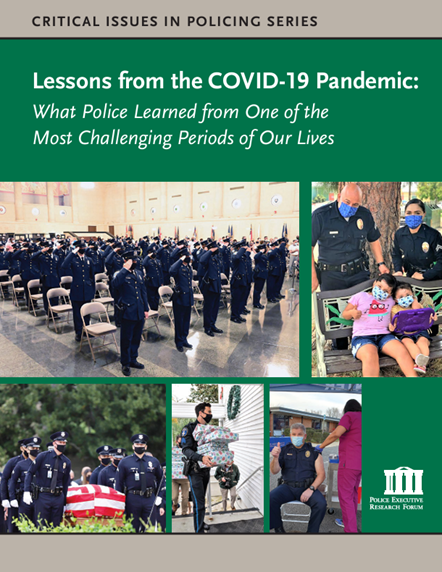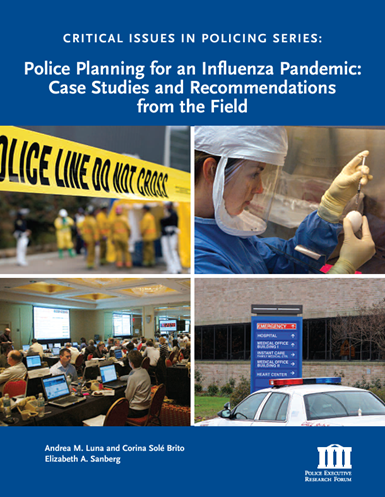|
March 16, 2024 Four years ago, the world as we know it changed
PERF members, Four years ago this week, everything changed for PERF, policing, this country, and the world. On March 11, 2020, the World Health Organization declared a global pandemic. Shops shut down. Offices and schools went remote. Police chiefs and sheriffs had to fundamentally change how they ensured the safety of their communities and their personnel. These steps would prove important – as even with them, according to the National Law Enforcement Officers Memorial Fund (NLEOMF), 768 officers died due to COVID-related causes from 2020-2022 – more than the 496 who died from all other causes combined. The Centers for Disease Control and Prevention (CDC) estimates that over 1.4 million deaths in the U.S. involved COVID-19. While not on the frontlines, here at PERF we were trying to figure out how this would affect policing and how we could support the profession. I remember one Friday we were testing how to work remotely, and by the following Monday, we had gone remote and the streets of Washington were empty. It was an eerie feeling, similar to the days after 9/11. PERF had some experience with this issue, having published Police Planning for an Influenza Pandemic: Case Studies and Recommendations from the Field in 2007. But like everyone else, every new day brought events unlike any we had ever seen. We were left wondering how we could continue to help our members do their work during this unprecedented time. In that first week, Craig Fischer, who was our amazing and insightful director of communications, suggested we could help the field by sharing daily updates about the pandemic and how policing and others were responding to it. As the pandemic presented new challenges in various locations, PERF could help police leaders quickly communicate lessons learned. On March 17, 2020, PERF published the first of what would go on to be 116 daily COVID-19 updates. It was an interview with Chief Cherie Harris from Kirkland, Washington, where 26 COVID-related deaths had occurred in a single nursing home. And day after day, we tracked the police-related aspects of the pandemic response. As the pandemic evolved and it became clear it would not be a brief public health emergency, policing faced additional challenges. George Floyd was murdered. Demonstrations – many peaceful, but some violent – erupted in cities nationwide, and even worldwide. The fentanyl/opioid epidemic accelerated – and without the pandemic likely would have dominated national discussions. Calls to “defund the police” echoed in houses of government and on many city streets. A significant police staffing crisis began to take hold. Other parts of the criminal justice system slowed down dramatically. And, likely a result of some combination of all of these factors, there was an historic increase in many types of crime – particularly homicides, nonfatal shootings, and carjackings. To help support the field, we widened our focus to include daily updates on these events, culminating in a total of over 260 reports. These reports wouldn’t have been possible without our members, who answered our phone calls and emails day after day to share their knowledge with their colleagues. In March 2021, I wrote a piece in this column highlighting some of the COVID and Critical Issues Daily Reports that stood out to me: -- Salisbury, Maryland emerged as one of the nation’s hot spots for COVID. The area has large Haitian and Hispanic populations working in the poultry plants. Many are not fluent in English and were not getting information about COVID. So the Police Department worked with public health agencies to communicate with those vulnerable populations and give them guidance about the virus. “For police to be seen as a resource, instead of just a part of the government to be feared, is going to be a win,” Chief Barbara Duncan told us. -- As early as March 31, sheriffs were telling us about their strategies for keeping COVID out of their jails. In Dane County, WI, Sheriff Dave Mahoney obtained UV-emitting robots, which are commonly used in hospitals, to disinfect his jail! -- European countries generally were hit with COVID a few weeks before the United States, so we looked to police officials in Italy, Israel, Scotland, England, and Northern Ireland about what they were facing, as a sort of bellwether of what the United States could expect. -- Very early in the crisis, we spoke with two chiefs who tested positive for COVID. Ironically, Aurora, IL Chief Kristen Ziman caught the virus when she met with other city officials in early March to discuss how to respond to the COVID crisis. Detroit Chief James Craig also had a rough time with COVID, and lost two members of his department in that first month. -- Many chiefs offered practical advice about how to manage COVID issues. Yonkers, NY developed a COVID hot spot in one precinct, where all 22 officers tested positive. “We realized it was because they were all riding together. You can’t be socially distant when you’re riding in a car with your partner,” Commissioner John Mueller told us. So he met with the unions and told them they would protect officers’ safety by continuing to send two officers to potentially dangerous calls, but they would drive in separate cars. -- No department was harder hit by COVID than the NYPD, so we interviewed Commissioner Dermot Shea five times over the past year. In the first interview, Commissioner Shea said that COVID reminded him of 9/11, because each was like nothing else he had ever seen. Already, on March 24, the number of officers out sick was more than double the normal. Shockingly, the next time I interviewed Dermot, just three weeks later, 27 members of the NYPD had died. Over the past year, 10,000 members of the NYPD have tested positive. -- Many of our Critical Issues reports were about George Floyd demonstrations. The experience in Portland was mind-boggling. On September 3, I interviewed Chief Chuck Lovell, who told us, “We’ve had nightly crowd control events for almost 100 nights straight. It’s been especially hard for our front-line folks. They get pelted with rocks and commercial-grade fireworks. We’ve had over 100 officers injured.” -- On a more positive note, one Critical Issues report told the inspiring story of police agencies in Massachusetts and Maine that are distributing fentanyl test strips to opioid users, to help them determine whether their drugs are laced with lethal fentanyl. “We’re not sure [if we’ll have grant funding for this program] going forward,” Edgartown, MA Chief Bruce McNamee told us. “But you can’t put a price tag on somebody’s life. We’re happy to incur that expense if we can prevent overdoses in our community.” 
We summarized the information found in these daily emails in a December 2021 report, Lessons from the COVID-19 Pandemic: What Police Learned from One of the Most Challenging Periods of Our Lives. Many aspects of daily life have returned to something close to normal. Homicides and many other violent crimes have fallen from their 2020-2021 peak. Just this week, crime analyst Jeff Asher published an analysis of shooting data from 18 cities, finding that “most of the cities (12 of 18) experienced gun violence at roughly the same level as they did before 2020 threw a wrench in everything. Some cities – like Baltimore and Boston – are seeing gun violence fall well below where it was in early 2020 (though gun violence in Baltimore is still well above where it was before 2015).” Let’s hope these trends continue. The last four years have been a remarkable period, and it has been a difficult time for many of us. The pandemic reinforced the importance of police during an emergency. In a crisis, the public looks to police for safety and support, which is why so many have devoted their lives to this noble profession. Despite the health concerns and public scrutiny, police demonstrated selfless bravery and courage during the most challenging health emergency of our lives. And on a final note, I want to thank the Motorola Solutions Foundation and the Howard G. Buffett Foundation for supporting this effort, and the PERF staff for all their hard work during the pandemic. I’ve never been prouder of our amazing staff than I was during the pandemic. Best, Chuck |

